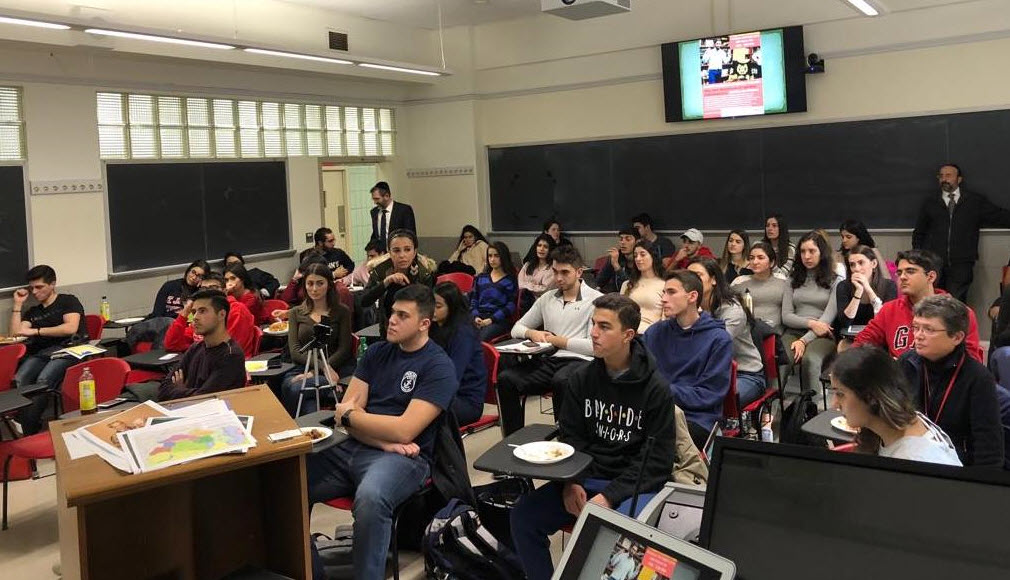By: Joseph Sachakov
On Oct. 29, The Jewish Students Association (JSA) at St. John’s University hosted Manashe Khaimov as a speaker at its weekly meeting. Khaimov serves as the Director of Community Engagement and Development at Queens College Hillel, and is also an adjunct professor at this college where he teaches a class titled, Bukharian Jewish History and Culture. It may be a surprise to some that there is an entire 3 credit course being taught at the City University on the history of such a small ethnic group. However, after listening to some of what Khaimov had to offer, there’s no wonder why the students at JSA were mesmerized.
 The goal of JSA is to provide Jewish students with a sense of community on this Catholic campus by socializing with the club members, learning about our religion, and connecting to our rich and deeply set heritage. Khaimov proved successful not only at informing students of JSA on the history of Bukharian Jewish culture but also waking up their Bukharian Jewish spirit.
The goal of JSA is to provide Jewish students with a sense of community on this Catholic campus by socializing with the club members, learning about our religion, and connecting to our rich and deeply set heritage. Khaimov proved successful not only at informing students of JSA on the history of Bukharian Jewish culture but also waking up their Bukharian Jewish spirit.
The Bukharian Jewish identity was in danger of disappearing entirely. It had survived despite three generations of oppression from a communist government followed by its complete collapse which resulted in a mass emigration out of Central Asia. At that point, there wasn’t much left of the original rich and vibrant culture that thrived for over the past two millennia. “Despite all of the oppression we have survived as a Jewish, traditional, G-d fearing community,” said Khaimov. Younger generations are the future of the Bukharian culture, and since they are at the greatest risk of forgetting their roots, Khaimov made it’s his mission to research the vast history and reach out to all in order to educate them about who they really are.

“The lack of resources online that you can count on motivated my research,” said Khaimov. “Although there is a vast array of information out there, there isn’t one definitive theory or opinion. There are many different theories and opinions. This led me to do research on the subject matter.”
“Then, one thing led to another and I thought about how my research could have a greater impact, so instead of just keeping all the knowledge to myself, why not share it with others? One thing that pushed me towards this direction was that whenever I would meet Bukharians of the older generations, they would always say that their ancestors came from Spain. That’s not entirely true and the history goes a lot deeper than that,” said Khaimov. His thirst for knowledge wasn’t only for personal reasons; he wanted to educate the Bukharian population on the truth of their origins.
“I really liked how he addressed the question of ‘if we aren’t all from Bukhara, why are we all called Bukharian Jews?’” said student and JSA member Milana Aminova. These questions confuse the younger generations and leave them without an understanding of who they really are.
“These are things that people want to know. It’s not like there’s a lot of people talking about this subject out there. Even if they do talk about these topics, they usually do them in Russian or other languages, but it’s hard to get this information from anywhere else. The students probably felt that this information was really dear to them” said Khaimov when asked why he thought the students enjoyed the presentation that he delivered at the JSA meeting. Khaimov also mentioned about MEROS: Center of Bukharian Jewish Research and Identity on the campus of Queens College, where he is planning to open up a library of Bukharian Jewish books so it can be available to the public.
“I always wondered about the Bukharian history,” pondered Rachel Munarov, another JSA member. “It’s nice that someone actually paid attention to it and came out to teach about it.” Khaimov feels that there is a disconnect when it comes to the youth. They don’t pay enough attention to their culture and believe that they should focus more on religious aspects for the sake of religious preservation. Khaimov strongly affirms that you cannot have one without the other. “Everybody tries to separate culture and religion; I see those things as one.”
Elvira Khaimova along with many other students from JSA eagerly stated that they would want Khaimov to return and give another presentation. “I would probably want him to talk more about the Bukharian Jewish community today, and inform us further about our ethnicity which we definitely do not know enough about,” says Khaimova, who is not related to Manashe Khaimov.
Students like Khaimova and others at JSA are the fuel that drives Manashe Khaimov to do what he does. He sees the younger generation has a thirst for knowledge and sets out to quench it for them. His ultimate goal is to shed light upon the vast but heavily clouded history of the Bukharian Jewish people. Doing so will, according to Khaimov, ensure the survival of the Bukharian Jewish nation. The Bukharian future relies heavily upon the youth and the elderly to start communicating with each other.
As Bukharian students at Queens College have taken on leadership positions at their campus Hillel, the Bukharian students at St. John’s are also proud to be active in promoting Jewish campus life. Equally important is knowing exactly who they are and the depth of their heritage as Bukharian Jews. Both colleges are located in Queens, New York surrounded by neighborhoods with large populations of Bukharian Jews.
Joseph Sachakov is the Recruiting Chair at the St. John’s University JSA and is studying with the goal of becoming a doctor.










